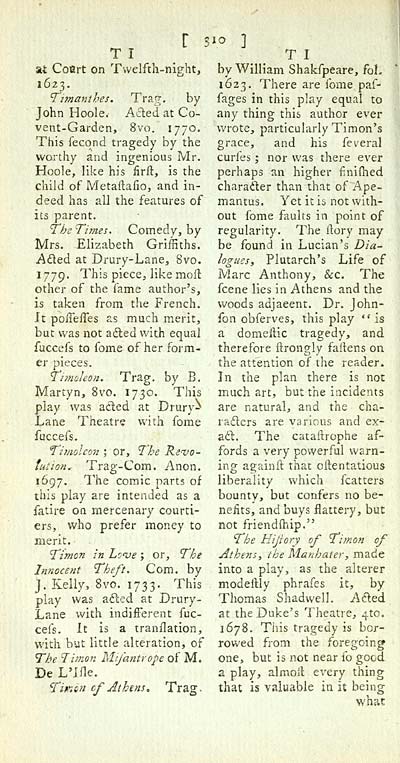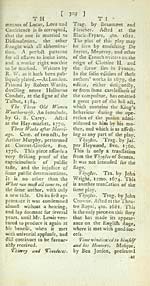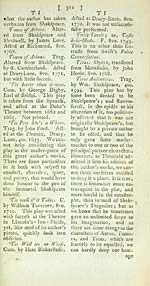Glen Collection of printed music > Printed text > New theatrical dictionary
(324) Page 310
Download files
Complete book:
Individual page:
Thumbnail gallery: Grid view | List view

C 3
T I
at Cofirt on Twelfth-night,
1623.
Timanthes. Trag. by
John Hoole. Acted at Co-
vent-Garden, 8vo. 1770.
This fecond tragedy by the
worthy and ingenious Mr.
Hoole, like his firft, is the
child of Metaftafio, and in-
deed has all the features of
its parent.
The Times, Comedy, by
Mrs. Elizabeth Griffiths.
Acted at Drury-Lane, 8vo.
1779. This piece, like moil
other of the fame author's,
is taken from the French.
Jt pofTefTes as much merit,
but was not acted with equal
fuccefs to fome of her form-
er pieces.
Ti?nokon. Trag. by B.
Martyn, 8vo. 1730. This
play was acted at Drury^
Lane Theatre with fome
fuccefs.
Ti mole on ; or, The Revo-
lution* Trag-Com. Anon.
1697. The comic parts of
this play are intended as a
fatire on mercenary courti-
ers, who prefer money to
merit.
Timon in Love ; or, The
Innocent Theft. Com. by
J. Kelly, 8vo. 1733. This
play was .acted at Drury-
Lane with indifferent fuc-
cefs. It is a tranflation,
with but little alteration, of
The Timon Mifantrope of M.
De L'Ifle.
Timon of Athens, Trag.
10 ]
T I
by William Shakfpeare, fol,
1623. There are fome paf-
fages in this play equal to
any thing this author ever
wrote, particularly Timon's
grace, and his feveral
curfes ; nor was there ever
perhaps an higher finilhed
character than that of Ape-
mantus. Yet it is not with-
out fome faults in point of
regularity. The ftory may
be found in Lucian's Dia-
logues, Plutarch's Life of
Marc Anthony, Sec. The
fcene lies in Athens and the
woods adjaeent. Dr. John-
fon obferves, this play " is
a domeftic tragedy, and
therefore ftrongly fattens on
the attention of the reader.
In the plan there is not
much art, but the incidents
are natural, and the cha-
racters are various and ex-
ad. The cataftrophe af-
fords a very powerful warn-
ing againft that oftentatious
liberality which fcatters
bounty, but confers no be-
nefits, and buys flattery, but
not friend (hip."
The Hijrory of Timon of
Athens, the Man hater, made
into a play, as the alterer
modeffcly phrafes it, by
Thomas Shadwell. A&ed
at the Duke's Theatre, 4*0.
1678. This tragedy is bor-
rowed from the foregoing
one, but is not near fo good
a play, almoil every thing
that is valuable in it being
what
T I
at Cofirt on Twelfth-night,
1623.
Timanthes. Trag. by
John Hoole. Acted at Co-
vent-Garden, 8vo. 1770.
This fecond tragedy by the
worthy and ingenious Mr.
Hoole, like his firft, is the
child of Metaftafio, and in-
deed has all the features of
its parent.
The Times, Comedy, by
Mrs. Elizabeth Griffiths.
Acted at Drury-Lane, 8vo.
1779. This piece, like moil
other of the fame author's,
is taken from the French.
Jt pofTefTes as much merit,
but was not acted with equal
fuccefs to fome of her form-
er pieces.
Ti?nokon. Trag. by B.
Martyn, 8vo. 1730. This
play was acted at Drury^
Lane Theatre with fome
fuccefs.
Ti mole on ; or, The Revo-
lution* Trag-Com. Anon.
1697. The comic parts of
this play are intended as a
fatire on mercenary courti-
ers, who prefer money to
merit.
Timon in Love ; or, The
Innocent Theft. Com. by
J. Kelly, 8vo. 1733. This
play was .acted at Drury-
Lane with indifferent fuc-
cefs. It is a tranflation,
with but little alteration, of
The Timon Mifantrope of M.
De L'Ifle.
Timon of Athens, Trag.
10 ]
T I
by William Shakfpeare, fol,
1623. There are fome paf-
fages in this play equal to
any thing this author ever
wrote, particularly Timon's
grace, and his feveral
curfes ; nor was there ever
perhaps an higher finilhed
character than that of Ape-
mantus. Yet it is not with-
out fome faults in point of
regularity. The ftory may
be found in Lucian's Dia-
logues, Plutarch's Life of
Marc Anthony, Sec. The
fcene lies in Athens and the
woods adjaeent. Dr. John-
fon obferves, this play " is
a domeftic tragedy, and
therefore ftrongly fattens on
the attention of the reader.
In the plan there is not
much art, but the incidents
are natural, and the cha-
racters are various and ex-
ad. The cataftrophe af-
fords a very powerful warn-
ing againft that oftentatious
liberality which fcatters
bounty, but confers no be-
nefits, and buys flattery, but
not friend (hip."
The Hijrory of Timon of
Athens, the Man hater, made
into a play, as the alterer
modeffcly phrafes it, by
Thomas Shadwell. A&ed
at the Duke's Theatre, 4*0.
1678. This tragedy is bor-
rowed from the foregoing
one, but is not near fo good
a play, almoil every thing
that is valuable in it being
what
Set display mode to: Large image | Transcription
Images and transcriptions on this page, including medium image downloads, may be used under the Creative Commons Attribution 4.0 International Licence unless otherwise stated. ![]()
| Special collections of printed music > Glen Collection of printed music > Printed text > New theatrical dictionary > (324) Page 310 |
|---|
| Permanent URL | https://digital.nls.uk/90319253 |
|---|
| Description | Scottish songs and music of the 18th and early 19th centuries, including music for the Highland bagpipe. These are selected items from the collection of John Glen (1833 to 1904). Also includes a few manuscripts, some treatises, and other books on the subject. |
|---|
| Description | The Glen Collection and the Inglis Collection represent mainly 18th and 19th century Scottish music, including Scottish songs. The collections of Berlioz and Verdi collected by bibliographer Cecil Hopkinson contain contemporary and later editions of the works of the two composers Berlioz and Verdi. |
|---|

